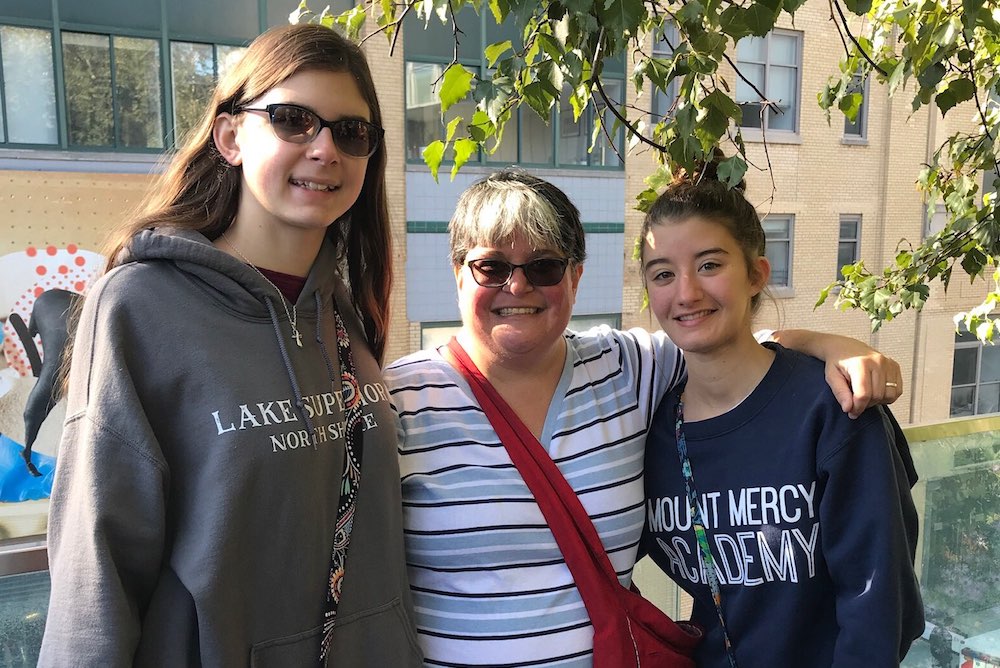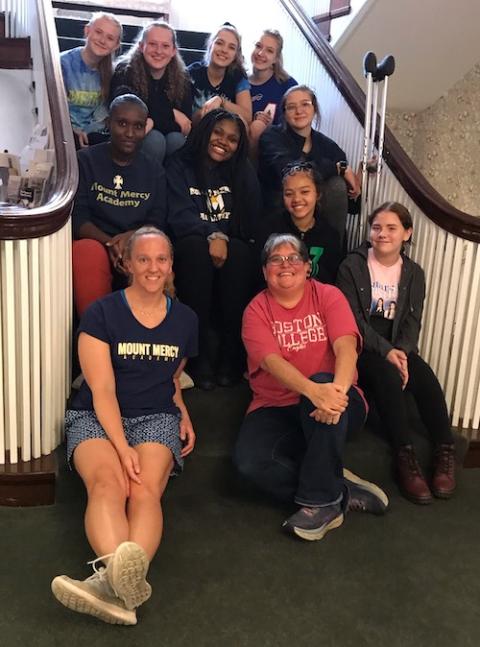
Sister Jenny with students in New York City, when there was no pandemic or closed classrooms (Provided photo)
COVID -19 will threaten life as we know it, or a similar headline, greeted me somewhere around the end of February. I had just returned from South America and felt disoriented. I wondered if I had missed something. I dismissed it as an overreaction by the media. Then, event after event began to get canceled. The days passed and life did begin to change. So much has happened since then. The pandemic continues to unfold, and recent protests against racism are increasing. But I continue to find glimmers of hope in both scenarios.
My school building closed and I grappled with what I was going to teach, as instruction turned to an online format. My mind raced with a million thoughts, the most prominent one being, how do you teach theology to high school students online? So much of what happens in the classroom with a subject like theology is discussion. My favorite part of teaching is the interaction with students. The hours of planning and grading are worth it when I see a student understand a concept or when I have a conversation with them that clearly demonstrates they are growing in their understanding.
I was randomly scrolling through my email, avoiding my lesson planning, when I saw a reminder from Global Sisters Report about GSR In the Classroom. I clicked on it, and after making a few small changes I had lessons for my students!
Once the students started turning in the lessons, I began to realize that their answers had exceeded my expectations. The lessons had provided me with a way to get them to think deeply, to process what was happening with COVID-19 and to think about God even if I was not in the classroom with them.
Advertisement
The lesson from March 26 entitled "Sisters Respond to Expanding Coronavirus Situation" was a thought-provoking lesson for my students. I marveled at how a lesson about sisters responding to the needs of the COVID-19 pandemic helped them to make several connections to their own lives. They answered the question, What is the hardest thing about living in isolation from other people? with honest answers revealing how they were coping.
Maria said, "The hardest thing for me is I miss social interaction with my friends, and I do not like learning from home; I would rather be in school."
Amy said the "hardest part is not feeling like I can go anywhere, and if I do, I have to avoid everyone."
Sara said, "I feel like there is now a barrier in my friendships because of not being able to actually be with people."
They were able to recognize what they were experiencing and when they answered the question: What do you pray God would do to make things better? their responses were not just focused on them. They included the needs of others as well.
Erin said, "I pray that God inspires others to make a cure for COVID-19. I also pray that God does not allow this virus to harm our generation's future. Lastly, I pray that God does not leave our side through this and that he stands by the families who are losing their loved ones due to this virus."
Kara said, "I pray that God helps all the heath care workers stay strong, as well as the patients suffering. I also pray that people who do not take this seriously, start to."
Amanda said "I pray to God that none of the worst-case scenarios will occur like a stronger second wave and that he guides scientists to quickly find a vaccine."

Sister Jenny with students in happier days, before social distancing (Provided photo)
I cried while reading their prayers. The tears were about missing them, missing the interaction and being grateful for the time I had already had in the classroom with them. My students were not just asking God to end COVID-19, they were asking God to lead people to helping it to end. They were truly praying. I remembered the first day of the school year and the weeks that followed. There would be someone who would pray for a new iPhone or for expensive shoes, and I would wonder if teaching them to pray really mattered. During these times I would hold back rolling my eyes and gently remind them that their prayers are a way of bringing the needs of others into the classroom with us. I would tell them that this was a way to ask God to help us and heal the difficult places in our lives and the lives of others.
The GSR lessons always have a part that connects the lesson to Scripture. This particular lesson referenced Mark 4: 38-39 and related to what Pope Francis said during the early days of the pandemic:
We find ourselves afraid and lost. Like the disciples in the Gospel, we were caught off guard by an unexpected turbulent storm. We have realized that we are on the same boat, all of us fragile and disoriented but at the same time important and needed, all of us called to row together.
The question the students were given was phrased like this: "We're all in the same boat" can seem like a cliché. What difference does it make to have Jesus in the boat?
Olivia said "to have Jesus in the boat, gives me hope."
Susan said, "with Jesus in the boat I am not as afraid, I feel comforted even though my life had changed, and I was expecting to have my life as it was taken away, but I know Jesus is with me and is helps me be less scared."
Michelle says "being in the same boat as Jesus matters because I feel protected, and I feel like I have someone to lean on through the most difficult times. No matter what happens, knowing that Jesus and God are with us through life and death gets me through."
The words of Pope Francis — "We have realized that we are on the same boat, all of us fragile and disoriented but at the same time important and needed, all of us called to row together" — have stayed with me. I wonder if change will really be implemented when the pandemic is over? Will we finally come together regardless of color of our skin?
My students give me hope. They have grown and changed since the beginning of the school year and when they were thrown into the unknown, they took what they had learned about God and who they were becoming and continued to apply it. As the days go by and we continue to navigate our changing world, I hope that we take the lessons we are learning and use our creativity to implement change.
[Jennifer Wilson is a member of the Sisters of Mercy of the Americas. Before entering the congregation, she completed two years as a Mercy Volunteer corps member in Guyana. Her graduate degree is in education and special education. She has worked with homeless women and children as a social worker and presently is a theology teacher and the diversity, inclusion and equity coordinator at Mount Mercy Academy in Buffalo, New York.]







